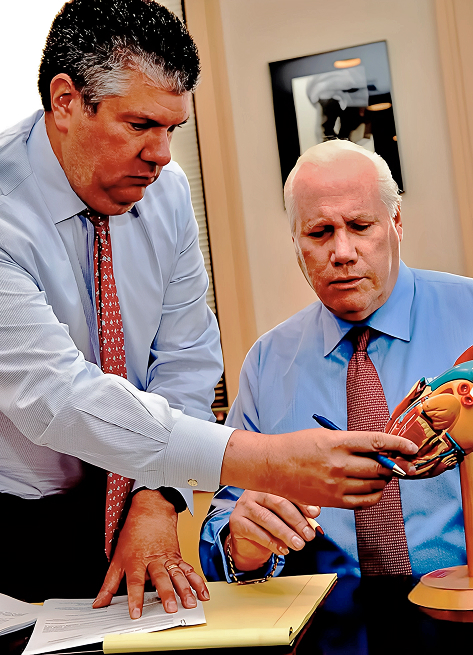When you’ve been injured in a personal injury accident, everything changes in an instant. What doesn’t change is your right to get the compensation you’re owed when someone else’s negligence caused your suffering.
If you’re searching for an Upstate New York personal injury lawyer, chances are you’re facing a difficult situation. You might have mounting medical bills, lost income, and a long recovery ahead of you.
Hiring the right lawyer can make all the difference in securing fair compensation and allowing you to focus on healing. Choosing legal representation is not just about finding someone knowledgeable in the law; it’s about finding advocates who know how to fight for you.
Schedule a Free Case Evaluation
Upstate New York Personal Injury Guide:
- How Much Compensation Can You Recover in an Upstate New York Personal Injury Case?
- What To Do in the Weeks After an Injury
- Taking On NY Insurance Companies: Why It’s an Uphill Battle
- How to Handle Social Media After a Personal Injury Accident in Upstate New York
- The Importance of Keeping a Personal Injury Journal
- Make the Call That Matters
Why Choose Queller Fisher as Your Upstate New York Personal Injury Lawyer

When your health, finances, and future are at stake, you need a law firm with a proven track record of achieving real client results. Queller Fisher has spent decades securing life-changing outcomes for personal injury victims across New York State.
Here’s why so many people choose our firm:
- Decades of Experience: Over 60 years of fighting for justice in personal injury cases.
- Proven Results: More than $1 billion recovered for injured clients.
- Highly Rated Attorneys: Recognized by Super Lawyers®, The Best Lawyers in America®, and other top legal organizations.
- Dedication to Clients: A 99.9% client satisfaction rate reflects our unwavering commitment.
- Local Knowledge: Familiarity with Upstate New York laws, courts, and insurance companies.
You deserve representation by a firm that puts your best interests first.
How Much Compensation Can You Recover in an Upstate New York Personal Injury Case?
When you pursue a personal injury claim in Upstate New York, compensation depends on the specifics of your case.
There are three main types of damages you might recover:
- Economic Damages: These reimburse you for financial losses directly tied to your injury. These may include medical expenses (past and future), lost wages, lost earning capacity, rehabilitation costs, and property damage.
- Non-Economic Damages: Injuries often go beyond physical harm. Compensation may be awarded for pain, suffering, emotional distress, and loss of enjoyment of life.
- Punitive Damages: Though rarer in personal injury cases, these damages punish exceptionally reckless or malicious behavior.
Every case is different, but our team ensures each client receives a detailed evaluation to capture the full extent of potential compensation.
With Queller Fisher by your side, you won’t leave money on the table when negotiating for what you’re truly owed.
What To Do in the Weeks After an Injury

The immediate aftermath of an accident can be chaotic, but the decisions you make in the following days and weeks can shape your case.
Here are essential steps to take to protect both your health and your legal rights:
- Seek Medical Attention: If you haven’t already, see a doctor promptly, even if you feel fine. Some injuries, like concussions or internal damage, may not show symptoms immediately.
- Document Your Case: Keep records of the accident, including medical visits, invoices, communication with insurance companies, and any time missed from work. If possible, secure physical evidence, such as photographs of the scene or your injuries.
- Avoid Speaking to Insurers Alone: Insurance companies may contact you with questions about the incident. Be cautious about what you say, as they may twist your words to reduce your payout. It’s best to consult with a lawyer before speaking to an adjuster.
- Contact a Lawyer Early: Legal deadlines, or statutes of limitations, apply to your claim. Waiting too long to file a case can cost you the ability to seek compensation.
When you move quickly and strategically, you’re better positioned to succeed.
Taking On NY Insurance Companies: Why It’s an Uphill Battle

Insurance companies may present themselves as concerned about your well-being, but their primary focus is on their bottom line. They often train adjusters to minimize payouts or outright deny claims when possible.
Here’s why negotiating with insurers alone can be a mistake:
How Insurance Companies Work After an Accident
The first thing you’ll likely receive from an insurer is a phone call. They may ask for a recorded statement about the accident or offer you a settlement soon after your injury.
While this might seem helpful on the surface, it’s often a tactic to get you to accept less than you deserve. Their representatives are trained to ask leading questions and push you to accept lowball offers.
The Difficulty of Getting Fair Compensation
Securing fair compensation for your losses isn’t straightforward. Without legal representation, many victims feel pressured to settle out of frustration or because they don’t understand their rights under New York law.
Worse, accepting a settlement closes the door on seeking additional compensation, even if your injuries worsen.
How to Handle Social Media After a Personal Injury Accident in Upstate New York
Social media has become an everyday part of our lives, but after a personal injury accident, your posts and activity can do more harm than good. What you share online might seem harmless, but insurance companies and opposing attorneys will look for anything they can use to minimize your claim.
While pursuing compensation for your injuries, it’s essential to be cautious about your activity on platforms like Facebook, Instagram, Twitter, and TikTok.
Why Social Media Matters in Your Case
When you file a personal injury claim, every detail of your case is under scrutiny—even your online presence. Insurance companies and defense attorneys often monitor social media accounts to gather evidence that could weaken your claim.
If they can point to a post or photo that contradicts your account of how the accident impacted your life, it may reduce the value of your settlement or even derail your case entirely.
What Not to Post on Social Media
To avoid jeopardizing your case, it’s important to be mindful of what you post online.
Here are some things you should avoid:
- Updates About the Accident or Injuries
Refrain from sharing details about what happened, the severity of your injuries, or your recovery process. Even well-meaning posts like “feeling stronger every day!” can be misinterpreted. - Photos or Videos
Any pictures or videos that show you active, even if they reflect ordinary moments, can be taken out of context. For example, a photo of you lifting a bag of groceries could lead to questions about the extent of your physical limitations. - Vacation or Travel Updates
If you post about taking a trip or attending an event, insurers might argue that your injuries have not significantly disrupted your lifestyle. - Expressions of Anger or Frustration
Avoid ranting or posting emotional responses about your accident, the at-fault party, or the legal process. These comments could make you seem combative or inconsistent. - Interactions from Friends and Family
Even comments or tagged posts by others can cause problems. If a friend tags you in a photo from an event you weren’t a part of, or congratulates you on looking great, it could create confusion about your actual condition.
The Importance of Keeping a Personal Injury Journal

After experiencing a personal injury, your life can feel like a whirlwind of appointments, pain, and uncertainty. A personal injury journal is a simple yet powerful tool to help you through this process.
Keeping a detailed record of how your injury affects your daily life not only aids in your recovery but also plays a vital role in strengthening your case.
What Is a Personal Injury Journal?
A personal injury journal is a written or digital record that tracks your experiences after an accident. It’s a space to document your physical symptoms, emotional challenges, and everyday struggles.
While it doesn’t need to be fancy or formal, consistency and detail are essential. Your journal is not just a way to express your thoughts but also a crucial piece of evidence that can support your personal injury claim.
What to Document in Your Journal
Your journal should focus on the details that paint an honest picture of how the injury has affected your life.
Here’s what to include:
- Pain Levels
Record your pain on a daily basis, noting its intensity and location. For example, did your back pain prevent you from sleeping through the night? Jotting down specifics can help others understand the full extent of your suffering. - Physical Limitations
Keep track of everyday activities you can no longer do or now struggle with because of your injury. Did household chores become impossible? Did you have to rely on others to drive you to appointments? These are important details. - Missed Activities or Events
Document moments you had to miss or enjoy differently because of your injury, such as family celebrations, vacations, or community events. This helps illustrate how much your life has been disrupted. - Medical Appointments and Treatments
Record every doctor’s appointment, therapy session, or treatment you attend. Include the date, the doctor’s name, and the purpose of the visit. Also, note how each treatment impacts your recovery process. - Medications
List the medications you’ve been prescribed, how often you take them, and any side effects you experience. This can help show how your injuries affected many aspects of your life. - Changes to Your Work Life
If your injury has made it harder or impossible to work, write down the challenges you’ve faced. For instance, are you struggling to maintain concentration? Did your injury require you to take unpaid leave or switch to limited hours?
Why a Personal Injury Journal Matters
Your journal is more than a diary; it’s evidence. Here’s how it helps your case:
- Proves the Extent of Your Pain and Suffering
Insurance companies often question how much your injury has really impacted your life. By providing specific, day-to-day details of your struggles, your journal offers a clear and credible narrative. - Supports Your Attorney’s Efforts
A well-maintained journal gives your attorney a firsthand look at how your injuries have affected you over time. This insight allows them to present a more accurate and compelling case on your behalf. - Prepares You for Testimony
If your case goes to court, your journal can help you recall important details. This ensures that your testimony is clear, consistent, and backed by firsthand accounts. - Strengthens the Timeline of Events
Detailed notes help build a timeline of your injury and recovery, from initial pain to the lasting effects months later. This is particularly valuable when proving long-term damages.
Tips for Keeping Your Journal
Maintaining a successful personal injury journal doesn’t have to be complicated.
Here are some tips to get started:
- Write regularly, preferably daily, so you don’t forget important details.
- Use clear and simple language to describe your experiences.
- Be honest. Don’t exaggerate or downplay your symptoms or struggles.
- Keep your journal private. Share it only with your attorney to protect its contents.
- Stick to the facts, avoiding personal opinions about blame or liability.
Working with us, you can see how tools like a personal injury journal can significantly improve your chances of securing fair compensation.
Make the Call That Matters

Your recovery is your top priority, but that doesn’t mean you have to face legal challenges alone. New York personal injury attorneys at Queller Fisher, we fight tirelessly for injured clients throughout Upstate New York.
Whether you need help understanding your options, dealing with insurance adjusters, or pursuing a claim, we’re here. Call us today at 212.406.1700 or 718.892.0400 for a free consultation. The path to justice starts with a simple step, and we’re ready to take it with you.
Schedule a Free Case Evaluation